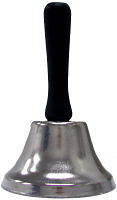Cow bells are something that nearly everyone has heard of. Although, in the present day and time it is more likely that a cow bell will be found as a musical instrument rather than found strung around the neck of a cow. So in that case why are they called cow bells, do cows still wear them, and what point do cowbells on a cow serve?
Well today we are going to find the answers to some of those questions for you.
Why are they called cow bells?
At one point in time you would almost never see a cow that did not have the lovely adornment of a bell around her neck. Each movement she made would result in a delightful tinkle of sound that would be emitted from the bell. Since it was only cows for the most point that were wearing them they became known as cow bells, even though some farmers also used them for sheep.
Do cows still wear them?
Not as much as they used to it seems. Very rarely do we see cow bells on the cows in southwest Virginia. But we have read that they are still widely used on cows in Switzerland and out west where farmers still have much more acreage than we have here.
What point does the cow bell serve on a cow?
Especially before the days of tagging cows, a cow bell was how a farmer would identify which cows were his if they got mixed in with another farmer's herd. Also, it made wandering cows easier to locate so that they could bring them back home.
Friday, January 20, 2012
Bells are...
Bells are many things. They are often found in holiday decor, or heard at big events such as ball games or weddings. They have been around for many centuries, used in church services, or just as a reminder of where one's cattle have wandered off to.
Bells can be customized for promoting a business, event, or cause. They can also be personalized for ornaments for the Christmas tree or for wedding bell favors at someone's nuptials.
Bells have been a part of nearly every culture for thousands of years and still remain a big part of our cultures to this day. Many people have a favorite type of bell or have a story that they remember about bells. We'd love to hear your bell story.
Bells can be customized for promoting a business, event, or cause. They can also be personalized for ornaments for the Christmas tree or for wedding bell favors at someone's nuptials.
Bells have been a part of nearly every culture for thousands of years and still remain a big part of our cultures to this day. Many people have a favorite type of bell or have a story that they remember about bells. We'd love to hear your bell story.
Wednesday, January 4, 2012
Ringing in the New Year
Many people have heard the phrase "ring in the New Year". But what does ringing in the new year mean?
When one thinks of the term ring in, usually a bell is thought of, mainly because bells ring. So what do bells have to do with the New Year?
Most old churches in many countries have large bells on them. These bells were used to let the community know when church was beginning, and also told of events. One of these events was of course the New Year. When one heard the church bells ringing on New Years day they would say that they were ringing in the New Year.
Today, some older churches still practice the custom of ringing in the new year, but the phrase has also taken on a new meaning. Many people use the phrase to indicate that they are celebrating the New Year.
So how did you ring in 2012?
When one thinks of the term ring in, usually a bell is thought of, mainly because bells ring. So what do bells have to do with the New Year?
Most old churches in many countries have large bells on them. These bells were used to let the community know when church was beginning, and also told of events. One of these events was of course the New Year. When one heard the church bells ringing on New Years day they would say that they were ringing in the New Year.
Today, some older churches still practice the custom of ringing in the new year, but the phrase has also taken on a new meaning. Many people use the phrase to indicate that they are celebrating the New Year.
So how did you ring in 2012?
Subscribe to:
Comments (Atom)



